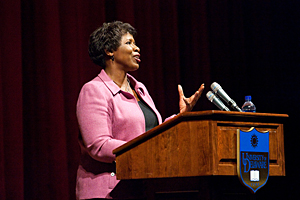ADVERTISEMENT
- Rozovsky wins prestigious NSF Early Career Award
- UD students meet alumni, experience 'closing bell' at NYSE
- Newark Police seek assistance in identifying suspects in robbery
- Rivlin says bipartisan budget action, stronger budget rules key to reversing debt
- Stink bugs shouldn't pose problem until late summer
- Gao to honor Placido Domingo in Washington performance
- Adopt-A-Highway project keeps Lewes road clean
- WVUD's Radiothon fundraiser runs April 1-10
- W.D. Snodgrass Symposium to honor Pulitzer winner
- New guide helps cancer patients manage symptoms
- UD in the News, March 25, 2011
- For the Record, March 25, 2011
- Public opinion expert discusses world views of U.S. in Global Agenda series
- Congressional delegation, dean laud Center for Community Research and Service program
- Center for Political Communication sets symposium on politics, entertainment
- Students work to raise funds, awareness of domestic violence
- Equestrian team wins regional championship in Western riding
- Markell, Harker stress importance of agriculture to Delaware's economy
- Carol A. Ammon MBA Case Competition winners announced
- Prof presents blood-clotting studies at Gordon Research Conference
- Sexual Assault Awareness Month events, programs announced
- Stay connected with Sea Grant, CEOE e-newsletter
- A message to UD regarding the tragedy in Japan
- More News >>
- March 31-May 14: REP stages Neil Simon's 'The Good Doctor'
- April 2: Newark plans annual 'wine and dine'
- April 5: Expert perspective on U.S. health care
- April 5: Comedian Ace Guillen to visit Scrounge
- April 6, May 4: School of Nursing sponsors research lecture series
- April 6-May 4: Confucius Institute presents Chinese Film Series on Wednesdays
- April 6: IPCC's Pachauri to discuss sustainable development in DENIN Dialogue Series
- April 7: 'WVUDstock' radiothon concert announced
- April 8: English Language Institute presents 'Arts in Translation'
- April 9: Green and Healthy Living Expo planned at The Bob
- April 9: Center for Political Communication to host Onion editor
- April 10: Alumni Easter Egg-stravaganza planned
- April 11: CDS session to focus on visual assistive technologies
- April 12: T.J. Stiles to speak at UDLA annual dinner
- April 15, 16: Annual UD push lawnmower tune-up scheduled
- April 15, 16: Master Players series presents iMusic 4, China Magpie
- April 15, 16: Delaware Symphony, UD chorus to perform Mahler work
- April 18: Former NFL Coach Bill Cowher featured in UD Speaks
- April 21-24: Sesame Street Live brings Elmo and friends to The Bob
- April 30: Save the date for Ag Day 2011 at UD
- April 30: Symposium to consider 'Frontiers at the Chemistry-Biology Interface'
- April 30-May 1: Relay for Life set at Delaware Field House
- May 4: Delaware Membrane Protein Symposium announced
- May 5: Northwestern University's Leon Keer to deliver Kerr lecture
- May 7: Women's volleyball team to host second annual Spring Fling
- Through May 3: SPPA announces speakers for 10th annual lecture series
- Through May 4: Global Agenda sees U.S. through others' eyes; World Bank president to speak
- Through May 4: 'Research on Race, Ethnicity, Culture' topic of series
- Through May 9: Black American Studies announces lecture series
- Through May 11: 'Challenges in Jewish Culture' lecture series announced
- Through May 11: Area Studies research featured in speaker series
- Through June 5: 'Andy Warhol: Behind the Camera' on view in Old College Gallery
- Through July 15: 'Bodyscapes' on view at Mechanical Hall Gallery
- More What's Happening >>
- UD calendar >>
- Middle States evaluation team on campus April 5
- Phipps named HR Liaison of the Quarter
- Senior wins iPad for participating in assessment study
- April 19: Procurement Services schedules information sessions
- UD Bookstore announces spring break hours
- HealthyU Wellness Program encourages employees to 'Step into Spring'
- April 8-29: Faculty roundtable series considers student engagement
- GRE is changing; learn more at April 15 info session
- April 30: UD Evening with Blue Rocks set for employees
- Morris Library to be open 24/7 during final exams
- More Campus FYI >>
2:16 p.m., Oct. 30, 2009----Noted journalist and author Gwen Ifill, author of the book The Breakthrough: Politics and Race in the Age of Obama, spoke about her newly released book and answered questions before a full house of students, faculty and community members on Thursday, Oct. 29, in the Thompson Theatre of the Roselle Center for the Arts at the University of Delaware.
Opening remarks were made by James Jones, director of the Black American Studies program at UD.
“I think it's fair to say of Gwen Ifill that she is comfortable in her own skin,” Jones said as he introduced Ifill, who is also a moderator and managing editor of Washington Week and senior correspondent for The NewsHour with Jim Lehrer. “She is smart, honest, fun, open, talented, objective and knowledgeable. She is a joy to be around and I am sure you will love her.”
Curiosity came naturally for Ifill, she said, adding that her father made sure that his children were aware of what was happening in the world, as the news was always on and newspapers were always in the house. These were some of the reasons as to why she wanted to become a journalist. She said whenever she talks to students, like she did earlier in the day at UD, she tells them to always stay curious.
“You have to always want to know what's going on around you, because once you've made up your mind, and you've decided you know, then you stop listening, and then you lose out,” she said. “I always tell people I'm a skeptic but not a cynic, because if you're a cynic, that means you've decided what you believe and you're done. But if you're a skeptic, you keep asking questions. It doesn't mean you always get the answers you want, but it means that your mind is always open to the possibility that the answer is there. So that's what drives me and it started when I was very small and it's continued through now.”
Writing the book
Ifill said she set out to write a book based on a theme that she had noticed during her entire career of covering politics as a journalist. The story she wanted to tell was about an entire generation of African American figures who had come to power after many thought the civil rights movement was over. “Basically, the fruit of the movement,” she said, as she then read an excerpt from her book.
President Barack Obama was simply one of many African American political figures chronicled in her book, those including the Rev. Jesse Jackson, Gov. Deval Patrick of Massachusetts, Alabama Congressman Artur Davis and Newark, N.J., Mayor Cory Booker. In fact, Ifill said she did not start writing the Obama chapter of the book until Nov. 5, 2008, after the election took place, guarding herself against assuming an outcome.
These political figures had many common traits, Ifill said. They had elite educations, they were resilient after defeat, and some of their parents were involved in the struggle to obtain the civil rights they currently have. Another common thread is that their racial authenticity was often questioned and they, Obama in particular, were highly suspect within the African American community at the start.
“People forget that African Americans did not support Barack Obama at the beginning,” she said. “In fact, they looked at him and said 'Who is this whippersnapper, I've never heard of him, and how do I not know he's one of them?' There was high suspicion. But more important, a lot of African Americans looked at him and said 'I don't think he'll win. He seems like a nice fellow, clean and articulate, but why should I vote for him? He'll never win.' So the question became for a lot of folks, 'Is he black enough?' That's what black people said.”
Ifill recalled a conversation she had with Obama in the summer of 2007 when she asked him about whether the prospect of electing a black president was affecting how people viewed him.
“He recounted a conversation he had with Rev. Jackson,” she said. “(Jackson) said something that's very accurate, Obama told me. He said 'Barack, we had to break the door down, which means sometimes we're not polite, we get bloodied up a little bit, you get some scars, but you haven't had to go through that, and that's a good thing. That's part of what we went through. I don't expect you to have the same battle scars that I did.'”
“And indeed he did not,” she continued. “Not only uniquely because Barack Obama was not raised largely on the 48 contiguous states, but also because he had a different world view on what race meant and how it could affect our lives, and importantly, how it can get you unelected. Because the key for every elected official, no matter what your background, is to close the distance between you and the voters as much as possible. You're constantly reminding them how different you are. They don't know why they should vote for you or that you will represent them.”
Race and politics
Ifill reflected back to the night of the South Carolina primary, a turning point in the Obama campaign, politically, but she spoke about a moment that took place that night after the results were in.
“The double-digit victory thrilled the multiracial crowd gathered that night in the heart of the South. When their candidate appeared on stage, they took up a chant. 'Race doesn't matter! Race doesn't matter!' The chant built and spread throughout the room. Now standing at the foot of the stage in the ballroom, just blocks from the state capital, Obama's pollster, Cornell Belcher, who was African American, watched all of this in astonishment.
“I talked to him after the election about it,” she continued. “He said this: 'Here you are, in South Carolina, three blocks from where the Confederate flag is still flying in front of the state capital, and all of the history that is held in this state, and you have a group of young white people shouting 'Race doesn't matter!' Now, do they think there is no racism? No, but were they screaming and shouting the world they wanted to exist? Yeah. That is powerful and profound and very different.'”
Ifill said Obama, like every other elected official in the United States, was keenly aware on how much the nation's mood swings on race could determine the outcome of a competitive election.
“Sometimes race helped, and sometimes it hurt, but it always mattered,” she said. “So if it matters, how do you turn it to your advantage? You find a way to speak across those lines and to consider race and the politics of difference to be a positive instead of a negative.”
After the lecture, a special presentation was made by Newark Mayor Vance A. Funk III in which Ifill was named honorary mayor of the city. A reception and book signing followed the presentation.
The lecture was sponsored by the Black American Studies Program, in cooperation with the Center for Black Culture, the College of Education and Public Policy, the Department of Communication, the Department of Political Science and International Relations, the Department of History, the Office of the Provost, the Commission to Promote Racial and Cultural Diversity, the College of Arts and Sciences, and the Office of the President.
Ifill's appearance was also a part of UD's fall public affairs lecture series, “Assessing Obama's First Year,” sponsored by the departments of Communication and Political Science and International Relations, the Office of the Provost, the College of Arts and Sciences and the School of Urban Affairs and Public Policy.
Article by Jon Bleiweis
Photos by Kevin Quinlan





